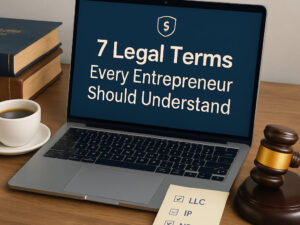7 legal tips for new bussiness owner
Legal terms for entrepreneurs:Starting a business is more than just launching a great product or service — it also involves navigating a world of legal complexities that can make or break your venture. From intellectual property to liability protection, entrepreneurs must equip themselves with essential legal knowledge to avoid costly mistakes.

Understanding legal terms doesn’t mean you need a law degree. But being familiar with fundamental legal concepts can empower you to make informed decisions, ensure compliance, and safeguard your startup’s future.
Here are seven crucial legal terms every entrepreneur should understand.
1. Limited Liability Company (LLC)
One of the most common business structures for startups and small businesses, a Limited Liability Company (LLC) combines the flexibility of a partnership with the liability protection of a corporation. This means that the owners (also called “members”) are not personally responsible for business debts or liabilities.
For Details explanation about ‘LLC’ check out our first blog
Why it matters for entrepreneurs:
- It separates personal and business assets, reducing personal financial risk.
- It offers pass-through taxation, where business income is reported on the owner’s personal tax return.
- It’s relatively easy and inexpensive to form and maintain compared to corporations.
Example: If your LLC incurs a business debt or is sued, your personal home or bank accounts are typically protected from creditors.
2. Intellectual Property (IP)
Intellectual Property refers to creations of the mind — such as inventions, designs, brand names, slogans, and proprietary software. There are four main types of IP protection: trademarks, copyrights, patents, and trade secrets.
| Type of IP | Protection Granted | Duration | Example |
|---|---|---|---|
| Copyright | Protects original literary and artistic works | Life of the author + 60 years (India) | Books, songs, films |
| Trademark | Protects brand names, logos, slogans | 10 years (renewable) | McDonald’s logo, Nike’s “Just Do It” |
| Patent | Protects new inventions and processes | 20 years | Pharmaceutical drug formulas, gadgets |
| Designs | Protects visual design or shape of a product | 10 years (extendable to 15) | Smartphone shape, furniture designs |
| Trade Secrets | Protects confidential business information | Indefinite (as long as secrecy is maintained) | Coca-Cola recipe, Google search algorithm |
Why it matters “legal terms for entrepreneurs”:
- Your brand identity and innovation are among your business’s most valuable assets.
- IP protection prevents others from copying or misusing your ideas and products.
- Licensing your IP can generate additional revenue.
Example: If you develop a unique logo and name for your startup, registering a trademark can help prevent competitors from using similar branding.
3. Non-Disclosure Agreement (NDA)
An NDA is a legal contract that prevents the sharing of confidential or proprietary information with unauthorized parties. NDAs are commonly used when discussing business ideas with partners, investors, or vendors.You can find sample NDA templates on platforms like Rocket Lawyer and LegalZoom.
If you don’t know what is Rocket lawyer and LegalZoom check out our “Rocket lawyer v/s Legalzoom
Why it matters for entrepreneurs:
- Protects your startup’s confidential information during early-stage discussions.
- Builds trust and professionalism with collaborators.
- Helps secure trade secrets and strategic plans from competitors.
Example: Before pitching your startup idea to a potential investor, you might ask them to sign an NDA to ensure they won’t disclose or steal your concept.
4. Operating Agreement
An Operating Agreement is an internal document that outlines how an LLC will be run, including member roles, voting rights, profit distribution, and dispute resolution processes.
| Section | Purpose |
|---|---|
| Business Purpose | States what the LLC does |
| Member Roles | Defines who does what |
| Capital Contributions | Shows what each member invests |
| Profit Sharing | Explains how profits are split |
| Decision Making | Sets voting rules |
| Dissolution | Details how the LLC ends |
Why it matters for entrepreneurs:
- Helps prevent misunderstandings between co-founders or members.
- Defines decision-making processes and ownership percentages.
- Provides clarity in case of member exit, death, or dissolution.
Example: If your business partner decides to leave the startup, the Operating Agreement will outline how their ownership share should be handled.
5. Liability
Liability refers to the legal responsibility for one’s actions or omissions. In the business context, it’s the obligation your company has in case of lawsuits, debts, injuries, or other legal claims.
Types of liability:
- Personal liability: When an individual is personally responsible for business debts.
- Product liability: When a product causes harm or injury to a customer.
- Premises liability: When someone gets injured on your business premises.
Why it matters for entrepreneurs:
- Choosing the right business structure (like an LLC or corporation) can reduce personal liability.
- Business insurance can protect against unforeseen legal claims.
Example: If your startup sells a product that malfunctions and injures a customer, you could face a product liability lawsuit.
6. Employment Law
Employment law governs the relationship between employers and employees. It covers areas like wages, working hours, discrimination, wrongful termination, and workplace safety.
| Aspect | Purpose |
|---|---|
| Employment Contracts | Outline roles and responsibilities |
| Minimum Wage | Ensures fair pay |
| Working Hours | Regulates work time and overtime |
| Leave Policies | Covers vacation, sick, and maternity leave |
| Workplace Safety | Protects employee health |
| Termination Rules | Guides fair dismissal practices |
Why it matters for entrepreneurs:
- Misclassifying workers as independent contractors can lead to fines and lawsuits.
- You need to comply with labor laws when hiring, firing, or managing team members.
- Understanding employment law helps build a fair and legally compliant workplace culture.
Example: If you terminate an employee without following proper procedures, your business could be sued for wrongful termination.
7.Complaince
Compliance refers to the act of following laws, regulations, and internal policies relevant to your business operations. This includes tax filings, licensing, data protection rules, and industry-specific regulations.
Why it matters for entrepreneurs:
- Non-compliance can lead to fines, business shutdowns, or legal disputes.
- Staying compliant improves your credibility with investors, partners, and customers.
- It ensures smoother business scaling and access to funding.
Example: A tech startup that collects user data must comply with data privacy laws like the General Data Protection Regulation (GDPR) or California Consumer Privacy Act (CCPA).
Why Legal Literacy Is Critical for Founders
Many entrepreneurs get so caught up in product development, marketing, and fundraising that legal basics are neglected. But legal literacy is foundational to long-term business success. Whether it’s protecting your brand, negotiating contracts, or managing risks, legal awareness helps you:
- Avoid lawsuits and penalties.
- Secure your intellectual property.
- Build strong business relationships.
- Prepare for funding and exits.
Investing in legal knowledge early on can prevent catastrophic errors later. Consulting a business attorney for major decisions — like setting up your entity, drafting contracts, or navigating regulations — is a wise move.

Bonus Tips for Entrepreneurs Navigating Legal Terrain
- Keep written records of all business dealings and agreements.
- Don’t rely on verbal contracts — always formalize arrangements with written documentation.
- Use templates cautiously. Many online contracts are generic and may not suit your specific needs. Customize or seek legal review.
- Update legal documents as your business evolves.
- Get legal insurance if possible, especially if you’re in a high-risk industry.
Final Thoughts
Entrepreneurship comes with excitement, ambition, and challenges — and one of the most overlooked yet crucial areas is legal knowledge. By understanding and embracing the legal aspects of running a business, you not only reduce risks but also build a stronger, more sustainable enterprise.
These seven legal terms — LLC, Intellectual Property, NDA, Operating Agreement, Liability, Employment Law, and Compliance — are just the beginning. But mastering them can go a long way in helping you avoid pitfalls and lead your business with confidence.
